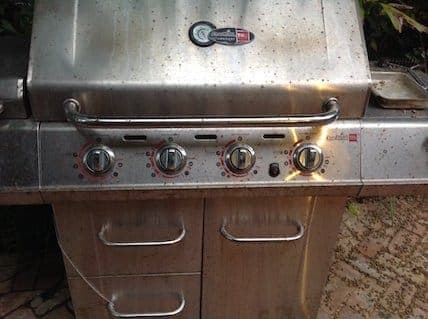
Curated with aloha by
Ted Mooney, P.E. RET

The authoritative public forum
for Metal Finishing 1989-2025

-----
Stainless Steel That is Magnetic?
Q. We are considering the purchase of a high-end stainless steel appliance. To be sure that it was stainless, and not brushed chrome, we tested it with a magnet and found it to be magnetic. The manufacturer says it's definitely stainless, and not brushed chrome. Can anyone explain this? And is a magnetic stainless a good quality metal for kitchen appliances? Thanks very much for anyone's response to this. Carly
Carling L [last name deleted for privacy by Editor]- Philadelphia, Pennsylvania, USA
2001
A. Hi Carling. Check your stainless knives, forks, and spoons with a magnet and you may discover the same situation, with some or all of them magnetic. The '400' series stainless steels (about 18% chrome, but no nickel in them) that are often used in a kitchen are magnetic. It's the '300' series stainless steels (18% chrome plus 8-10% nickel) that are non-magnetic (even then, cold rolling the panels can make them magnetic). Magnetic stainless is probably good enough for a kitchen, but it is less expensive (and not as good) as the non-magnetic stainless steels.

Ted Mooney, P.E.
Striving to live Aloha
finishing.com - Pine Beach, New Jersey
2001
A. Type 400 series stainless contains no nickel (one of the most expensive elements in stainless alloy), therefore is cheaper in price. Some of the better flatware products are type 304 or (18-8) stainless.
Type 304 stainless offers better corrosion resistance than the 400 series. Most architectural stainless is done in the 300 series.

Michael Liu Taylor
specialty stainless steel distributor - Dallas, Texas
2001
A. Carling,
As the above people have said, the series 400 stainless is magnetic and the 300 series for practical kitchen purposes is non magnetic.
The 400 series knives, etc., keep a nice sharp edge, the 300 series don't corrode so easily and they are softer, due to the nickel, one assumes.
HOWEVER, strictly speaking, series 300 ARE magnetic. If one were towing a magnetometer behind an aircraft to measure ground magnetism, the instrument will fail were stainless used ... something to do with magnetic flux. Instead, one makes the instrument from aluminium.
... in the 60's we used to make plastic 'birds', as they were called, for towing behind aircraft (for Barringer Research's magnetometers) and aerodynamically one had to be very careful otherwise these 'birds' would swing around crazily and chase the aircraft! That's when they and we learned about about stainless and magnetism. End of boring story.
Cheers !

Freeman Newton [deceased]
(It is our sad duty to advise that Freeman passed away
April 21, 2012. R.I.P. old friend).
2001
2001
A. All of the above is correct, but probably not the answer to your question. My guess is that the side panels of your stainless steel kitchen appliances are probably made from cold-rolled 300 series stainless steel - probably type 301 or 302. These alloys have very similar chemical composition (18 Cr and 8 Ni) and corrosion resistance to type 304, which was mentioned above. These are all nominally austenitic alloys (nonmagnetic), but some of the austenite transforms to martensite (magnetic) when the material is deformed, as in cold rolling. This martensite transformation causes the 300-series to be magnetic when cold formed.
The cold-rolled condition is much harder than annealed material, which helps to keep the panels stiff and resistant to denting, even when very thin. An annealed 304 stainless steel panel would dent easily and would soon be not very pretty from normal wear and tear.
The magnetic response for the appliance panels is similar to that for kitchen flatware, which is mostly made from 18-8 stainless steel. Cutlery (knives), scissors, and the like are often made from 400 series alloys, which can be heat treated to high hardness for sharpening. The 300 series alloys cannot be hardened by heat treating.
I hope that this makes sense. If you really want to know how the panels are made, I bet that you could contact the manufacturer and track down a materials engineer who would set things straight.

Larry Hanke
Minneapolis, Minnesota
![]() Thanks so very much for this info. We will go ahead and purchase this item and not be worried about getting inferior stainless.
Thanks so very much for this info. We will go ahead and purchase this item and not be worried about getting inferior stainless.
We appreciate the time you, and all the others who replied, have taken to write.
Carly
Carly L [last name deleted for privacy by Editor]- Philadelphia, Pennsylvania USA
2001
2001
Don't leave this book with the last page ripped out, though, Carly. Give us the manufacturer and model no. after you buy it, and we'll try to get their materials engineer to chime in as Mr. Hanke suggested.

Ted Mooney, P.E.
Striving to live Aloha
finishing.com - Pine Beach, New Jersey
A. Sir,
There are magnetic and non-magnetic alloys and formations of stainless steel however, if you will take a magnet and compare the strength of pull against ASTM steel, you will find that the pull of a magnet toward "any" stainless steel is quite a bit less than that for mild steel.
Norman B. Czerski- Eagle River, Alaska, USA
2003
Q. I would like to put stainless panels in my built-in refrigerator, but I would like them to be magnetic. These are custom made/cut. I am wondering if I can use the 400 series stainless steel for this purpose or if there's a functional reason that I would need to use the 300 series.
Thank you.
Giselle G [last name deleted for privacy by Editor]- San Francisco, California, USA
2003
A. Stainless steel 300 series are slightly magnetic since they can contain from 0 to 8% ferrite formed after solidification depending of the chemistry of the steel batch. The second cause of magnetic response is martensitic transformation upon cold working or machining (alloy 301 work hardens and responds the most that way).
In order to have a soft response to magnet the Ni/Cr ratio must be high. Also to maintain magnetic response to minimum a solution anneal treatment can be done 1095 °C then rapid quench. A stress relieve treatment on non-sensitizing grades like 304L can be done at 700-800 °C (this cannot be done on 304 or 316 because carbides will precipitate and the part will corrode.
Guy Morin- Trois-Rivières, QC, Canada
2005
Q. I recently bought a barbecue, made by Charmglow from Home Depot; listed materials in construction are stainless steel and aluminum. I tried the magnet test and found that it adhered to most of the grill (excepting the side panels of the cover, cast aluminum). The only part the magnet would not adhere to was the lifting handle on the cover on the grill. If it's not brushed/polished finish, to me it looks like paint on steel -- is there a way to determine if the flat panels and frame are stainless or aluminum or just painted steel before I return it?
Also, if the side panels are 400 series stainless, how will their corrosion resistance be in the salt air of the Fla. keys? ... but it looks soooooooo pretty :(
- Key Largo, Florida, USA
2005
Q. ARE MANUFACTURERS PASSING OFF STEEL USED ON REFRIGERATORS AS 'STAINLESS', WHEN IT STAINS LIKE WATER MARKS AND IS NON-MAGNETIC?
COLSTER SOULCONSUMER - UK
May 31, 2008
A. Hi, Colster. Yes, some of them.
Plain steel is magnetic. The best grades of stainless steel are non-magnetic, but some grades of stainless steel are magnetic (the grades that don't have nickel in them). Plain steel does not corrode with white water marks, it corrodes with red rust. Water marks are usually from using a cleaner that is not compatible with the stainless.
To make a confusing situation even more confusing, many manufacturers now coat the stainless steel with some kind of organic clearcoat (a clear paint); and others ("Clean Steel" style) paint plain steel to make it look like stainless.
Regardless, don't consider the finish on stainless steel appliances as robust; it may look "industrial strength" but it is anything but! Painted appliances are far more robust than stainless steel, as hundreds of sob stories about disappointment with stainless appliances on this site attest.
Regards,

Ted Mooney, P.E.
Striving to live Aloha
finishing.com - Pine Beach, New Jersey
June 2, 2008
![]() Thank you Ted for your informative message. I wish I had contacted you before choosing my "stainless steel" fridge/freezer. I am very disappointed with its appearance after only three months' use. A liquid appears to have dripped down the lower door leaving grey marks. I had explained to the salesperson that I wanted a labour-saving kitchen owing to my weak hands and mobility problem. A note with the appliance warned not to use harsh cleaners but that now recommended contains citric acid . I should have stuck to white, but already had a Neff s/s oven which is easy to keep clean. I think there should be a warning notice on 'stainless steel' which is not stainless. Again thanks.
Thank you Ted for your informative message. I wish I had contacted you before choosing my "stainless steel" fridge/freezer. I am very disappointed with its appearance after only three months' use. A liquid appears to have dripped down the lower door leaving grey marks. I had explained to the salesperson that I wanted a labour-saving kitchen owing to my weak hands and mobility problem. A note with the appliance warned not to use harsh cleaners but that now recommended contains citric acid . I should have stuck to white, but already had a Neff s/s oven which is easy to keep clean. I think there should be a warning notice on 'stainless steel' which is not stainless. Again thanks.
- Solihull, England
June 16, 2008
A. To put everyone at rest, stainless steel sometimes becomes magnetic if it has been worked with or cast. We sell Stainless Steel Fittings and always have this issue with clients and their silly magnets and who don't understand the physics behind metal.
Christopher EuropaStainless Steel Fittings Supplier - Cape Town, South Africa
October 8, 2010
October 2010
![]() Thanks, Christopher. You are right that magnets don't tell the whole story; one simple test almost never does.
Thanks, Christopher. You are right that magnets don't tell the whole story; one simple test almost never does.
opinion! But the reason that people try a magnet to check whether something is stainless or not isn't silliness, it's because the performance of magnetic stainless steel has proven so unsatisfactory. When a consumer spends $1000+ for what is promoted as stainless steel, they shouldn't have to "understand the physics behind metal" to avoid being deceived by the manufacturer, some of whom are working very hard to do just exactly that. Before we dismiss people as "silly" for using the limited tools at their disposal, I think we should examine what we may be doing that is delivering performance that they are justifiably disgusted with. My non-magnetic Frigidaire fridge, Maytag microwave, and Kenmore range all look fine ... whereas my newer Bosch magnetic stainless dishwasher is a disgrace -- which is a shame because, other than aesthetically, it's a good appliance. Am I "silly" when I decide I'll bring a magnet next time?
As another example, flatware manufacturers like Oneida have cheapened their patterns by converting them from 18/8 (type 3xx) to 18/0 (type 4xx). When people experience rusting, they test and find that their new pieces which are rusting are magnetic, unlike their old pattern pieces that didn't rust. Damn magnets, how can we let consumers be so unfair to Oneida? As another example, we may sometimes label a cast stainless steel fitting "type 316" even though metallurgists tell us that castings are not actually type 316, and even though they will rust under conditions where people know that rolled or wrought 316 would not rust; so the buyer tests it with a magnet and finds that the casting is magnetic. Are they misunderstanding the physics of metal, or are we wrong in trying to call it 316 when it is actually a casting and is far more prone to rusting than people have come to expect from a "316 stainless steel" label?
Regards,

Ted Mooney, P.E.
Striving to live Aloha
finishing.com - Pine Beach, New Jersey
Q. Can I do magnetic test to SA 240 Gr 321
Thanks,
- Algeria
March 14, 2012
A. Hi, Abdelkrim. There are dozens of grades of stainless steel that are magnetic and dozens that aren't. So, while a strongly magnetic sample is probably not type 321, unfortunately a non-magnetic type is not necessarily 321.
Regards,

Ted Mooney, P.E.
Striving to live Aloha
finishing.com - Pine Beach, New Jersey
March 15, 2012
Q. We have received from a local vendor M6x10 set screws in duplex steel of grade 1.4410. The supplies are supported by a Compliance letter stating that the material grade is 1.4410.However, the screws are found to be Non-magnetic.
Is our Rejection stating that "Material of screws is not "Duplex steel", but appears to be "Stainless steel" justified based on testing with a magnet.
- Saudi Arabia
March 17, 2012
A. 1.4410 is a super duplex stainless steel with a microstructure of 50:50 Austenite & Ferrite.
Madan Mohan- Saudi Arabia
July 26, 2012
A. There are two types of 400 series steels, Martensitic and Ferritic. Martensitic is magnetic; Austentic (300 series) and Ferritic are not, from my understanding.
Thanks
- Hopkinsville, Kentucky, USA
May 10, 2012
A. Austenitic stainless (300 series) is what the industry calls non-magnetic, while martensitic and ferritic are magnetic.
The fact that an appliance such as a dishwasher is stained does not mean it isn't stainless steel, but may be a result of calcium or other substance in hard water being deposited on a not-mirror-smooth surface. Stainless steel is not absolutely stain-proof as the name might imply, but much more resistant to corrosives than non-stainless steels with less chromium and nickel.
If you want to see the difference, buy a small piece of mild steel plate from your local hardware supplier and put it in an out-of-the-way place in your dishwasher for six months... Then compare to the inside walls of the dishwasher.
- Layton, Utah, USA
April 9, 2014
![]() Hi John, I appreciate the input, but my magnetic Bosch dishwasher did not succumb to calcium staining which my non-magnetic appliances were not exposed to ... it's 'stainless' material is grossly inferior, period.
Hi John, I appreciate the input, but my magnetic Bosch dishwasher did not succumb to calcium staining which my non-magnetic appliances were not exposed to ... it's 'stainless' material is grossly inferior, period.
Regards,

Ted Mooney, P.E.
Striving to live Aloha
finishing.com - Pine Beach, New Jersey

Stainless B-B-Q is all rusted up in 3 months
Q. I bought a stainless steel range and after 2 years the front panel or door oven started to show multiple corrosion spots. I bought a Charbroil barbecue that cost me over $400 and after 3 months was full of corrosion spots.
Stainless steel is not supposed to corrode. How can I buy an appliance or barbecue that does not corrode. The magnet will help?
Thank for your advice.
- Miami, Florida, USA
March 20, 2016
A. That's easy Marino, buy painted appliances! My painted Weber B-B-Q grill is 3 years old, never covered, and fine.
But my Kenmore stove/oven is non magnetic stainless steel and is fine too. Call me a "silly magnets guy who doesn't understand the physics behind metal", but the magnetic stainless steel of my Bosch dishwasher, which is much newer than the stove, and sitting right next to it, is very stained and discolored.
You might try to solve the grill problem by cleaning with citric acid and then clearcoating it. And be careful that you are not splashing from a hose with fertilizer onto your grill; that accelerates rusting.
Regards,

Ted Mooney, P.E. RET
Striving to live Aloha
finishing.com - Pine Beach, New Jersey
March 2016
Stainless IS just that ... Stain LESS! Many manufacturers are turning to SS430 metal due to cost and availability. As well, a good test for rust-resistance is a magnet. If it holds a magnet then it is more susceptible to rust as less passive.
adv.
Either case, Scratch-B-Gone will quickly and safely remove this damage and restore your finish.
Good grilling.

Barry Feinman - Chief Restoration Officer
BarrysRestoreItAll
Carlsbad, California

June 29, 2016
Q. Hi. Is there a stainless steel that's more magnetic than a low carbon steel or even close?
I'm trying to find the strongest magnetic steel I can that's also hopefully easily machined. You can see on my website that the rotor steel needs to be both strong and highly magnetic for better motor performance. The center steel need not be magnetic and I'm using 1144 but the rotor part really benefits from the 1018's magnetic properties but it's not as strong as maybe possible.
Steelhubs.com - SF California USA
September 26, 2016
October 25, 2016
![]() Another resource on the topic:
Another resource on the topic:
https://www.scientificamerican.com/article/why-dont-magnets-work-on/
Found my way here when I got a variety of results using a magnet to test All-Clad cookware, Bosch dishwasher etc. You know, just testing everything in the house since reading this thread.
- Portland, Oregon USA
![]() Hi Don. Remember that magnetic induction cookware must be magnetic :-)
Hi Don. Remember that magnetic induction cookware must be magnetic :-)
Regards,

Ted Mooney, P.E. RET
Striving to live Aloha
finishing.com - Pine Beach, New Jersey
Lattice constant of stainless steel?
I need to know the lattice constant "a" of the unit cell of Ferritic stainless steel.
Mamdouh YounesShell Products Limited - Hamilton, Ontario, Canada
July 20, 2017
Comment: I used to manufacture parts out of various grades of stainless steel. Often times including welding, so I always had the products passivated which would make the stainless a lot more resistant to corroding.
Dan PomeroyPomeroy Industries - Menlo Park California USA
February 21, 2019
this text gets replaced with bannerText

Q, A, or Comment on THIS thread -or- Start a NEW Thread